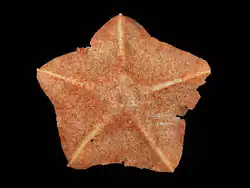Anseropoda placenta
| Anseropoda placenta | |
|---|---|

| |
| Scientific classification | |
| Kingdom: | Animalia |
| Phylum: | Echinodermata |
| Class: | Asteroidea |
| Order: | Valvatida |
| Family: | Asterinidae |
| Genus: | Anseropoda |
| Species: | A. placenta
|
| Binomial name | |
| Anseropoda placenta Pennant, 1777
| |
| Synonyms[1] | |
| |
Anseropoda placenta, also called the goose foot starfish,[2] is a species of sea star in the family Asterinidae.[3]
Description
Anseropoda placenta is up to 20 cm (7.9 in) in diameter. It's a very thin, leaflike, flat sea star with short webbed arms. Its specific name placenta refers to a kind of flat cake. The aboral surface (top) has a texture of small plates; it is white with five radiating red lines, one down the centre of each arm.[4]
Distribution
Most common in the Irish Sea and English Channel, and is more rarely found off Scotland.[5] It is in rapid decline in Northern Ireland due to bottom fishing.[6]
Environment
Anseropoda placenta is sublittoral, typically living at 20–40 m (66–131 ft) depth, in muddy sand or muddy gravel; it has been found as deep as 500 m (1,600 ft).[4][7]
Behaviour
Anseropoda placenta produces large eggs in the summer.[5] It feeds on benthic molluscs, crustaceans and echinoderms.[7]
Gallery
-
 Aboral (upper) surface
Aboral (upper) surface -
 Oral surface (underside)
Oral surface (underside) -
 Illustration
Illustration -
 Depicted on an Albanian stamp
Depicted on an Albanian stamp
References
- ^ "WoRMS - World Register of Marine Species - Anseropoda placenta (Pennant, 1777)". www.marinespecies.org.
- ^ "Anseropoda placenta : Goose foot starfish | NBN Atlas". species.nbnatlas.org.
- ^ "Anseropoda placenta - Detail - Biodiversity Maps". maps.biodiversityireland.ie.
- ^ a b "Anseropoda placenta - Marine Life Encyclopedia". www.habitas.org.uk.
- ^ a b "WoRMS - World Register of Marine Species - Anseropoda placenta (Pennant, 1777)". www.marinespecies.org.
- ^ "Anseropoda placenta Goosefoot starfish :: Northern Ireland's Priority Species ::". www.habitas.org.uk.
- ^ a b "MarLIN - The Marine Life Information Network - Goose foot starfish (Anseropoda placenta)". www.marlin.ac.uk.